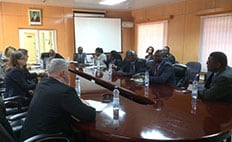Strengthening National Public Health Institutes Globally
March 15, 2017
Prevention, detection, and response to public health emergencies, requires every country to be equipped to carry out a set of functions that are the cornerstone of strong public health systems.
Many countries consolidate these functions organizationally in a national public health institute (NPHI) – a science-based organization, or network of organizations, that provides leadership and coordination for public health at the national level. In most cases, the NPHI is part of the government, usually within or attached to the Ministry of Health. NPHIs promote evidence-based decisions, policies, and programs, and become the logical partner in government-to-government public health relationships.
CDC is helping to establish NPHIs in other countries. This assistance includes linking governments with an existing NPHI in another country or with U.S. State Health Departments. As of December 2016, CDC was supporting 20 countries to either develop or strengthen their NPHIs.
New and stronger NPHIs are developing in both high- and low-resource countries. During times of emergency, the need for NPHIs becomes most apparent because leadership and timely reliable data are critical for an effective response that saves lives. For example, following the Ebola outbreak which devastated Sierra Leone from 2014 to 2015, the country determined that establishing an NPHI would help improve its response to future outbreaks.
Since August 2016, DGHP experts in Workforce and Institute Development and others from across CDC, have been working with Sierra Leone’s Ministry of Health and Sanitation to help establish the Sierra Leone National Public Health Agency (NPHA). With an NPHA, the government will be able to detect and respond to public health emergencies more effectively, increase the likelihood of controlling public health problems at their source, and enhance global health security.

Stopping cholera early requires a strong national public health system, and this is part of the vision of the new Zambia National Public Health Institute (ZNPHI). A response to a 2016 cholera outbreak gave ZNPHI the opportunity to identify strengths and set priorities as it develops Zambia’s first Public Health Emergency Operations Center (PHEOC).
Left: Representatives from CDC, IANPHI, and ZNPHI meet with Zambia’s Disaster Management and Mitigation Unit to discuss PHEOC plans.